 |
| Statue of Godess Fortuna, Rome, Italy 150-200 CE |
 |
| Statue of a Magistrate, Italy 70-90 CE (head), early 2nd century CE (body) |
 |
| Roman and Dacian Arms Relief, Rome, Italy 100-200 CE |
 |
| Statue Head of Commodus, probably Italy, about 185-190 CE |
Last Friday, the Rome: City to Empire exhibition from the British Museum opened at the National Museum of Australia, here in Canberra. This exhibition is open until 3 February 2019. I diligently photographed everything in the exhibition but some photos, mainly the 18th century prints, didn't turn out very well, so I haven't included them and apologies for the quality of some of the photos. There are more than 200 objects from the British Museum in this exhibition so it will take five posts to cover them all.
 |
| Ceramic Burial Urn, Alban Hills, Italy, 900-800 BCE |
 |
| Bronze Cista (casket), probably Cerveteri, Italy, 300-250 BCE |
 |
| Copper Alloy Decorative Plaque, London, England 100-300 CE |
 |
| Bronze Mirror, Palestrina, Italy 350-300 BCE |
 |
| Alabaster Burial Chest, probably from Volterra, Italy about 100 BCE |
 |
| Portrait Head of Marcus Agrippa, Capri, Italy 20-40 CE |
 |
| Portrait Head of a Citizen, Rome, Italy about 1st century BCE |
 |
| Statue Head of Augustus, Rome, Italy about 30 BCE |
 |
| Silver Carthaginian Coin, minted in Spain, 237-209 BCE (top left), Silver Republican Roman Coins - Celebrating the Conquest of Gaul 48 BCE( bottom left), A Coin struck for Julius Caesar 44 BCE (top right), A Coin Celebrating the Assassination of Julius Caesar 43-42 BCE (bottom right) |
 |
| Bronze Statuette of a Lictor, probably Italy, 1st century CE |
 |
| Gold and Jasper Ring depicting Mark Antony, probably Italy, 40-30 BCE |
 |
| Portrait Head resembling Cleopatra, Italy, 50-30 BCE |
 |
| Terracotta Plaque Showing Two Figures of Hope, Rome, Italy about 50 BCE -100 CE |
 |
| Bronze Parade Helmet with Woman's Face, Nola, Italy 2nd century CE |
 |
| Iron Pugio (dagger), Kingsholm, Gloucestershire, England, mid-1st century CE |
 |
| Ceramic Tile Antefix Legio XX Valeria Victrix, Holt, England, 2nd-3rd century CE |
 |
| Bronze Figurine of an Eagle, probably Italy, 1st-3rd century CE |
 |
| Bronze Legionary Helmet, Norcott Hill, Hertfordshire, England, 1st century CE |
 |
| Bronze Military Citizenship Diploma, Brigetio, Hungary, 122 CE |
 |
| Iron Pila Heads, Hod Hill, Dorset, England, mid-1st century CE |
 |
| Tombstone of Aurelius Saturninus, Rome, Italy, 2nd century CE |
 |
| Statue Head of Germania, probably Italy, 1st-2nd century CE |
 |
| Copper Alloy Sestertius of Trajan, minted in Rome, Italy 106-111 CE, Gold Aureus of Domitian, minted in Rome, Italy, 86 CE, Gold Aureus of Vespasian, minted in Rome, Italy 72-73 CE |
 |
| Portrait Head of the Emperor Titus, Porta Portese, Italy, late 1st century CE |
 |
| Animal Hunts Relief, Ephesus, Turkey, 1st-2nd century CE |

































Fantastic! Thank You for a photos!
ReplyDeleteThanks Michal, it's a great exhibition.
DeleteDefinitively a place to visit!
ReplyDeleteThanks Phil, the British Museum has an amazing collection.
DeleteVery, very interesting artifacts! All nicely preserved too.
ReplyDeleteThanks Dean, we don't get to see this sort of exhibition here very often.
DeleteNice post, the British museum is one of my favourites but it can be a bit overwhelming because there's just so much great stuff in it!
ReplyDeleteBest Iain
Thanks Iain, the British Museum is amazing and overwhelming, we visited in 2011 but it is great to see this exhibition out here.
Delete